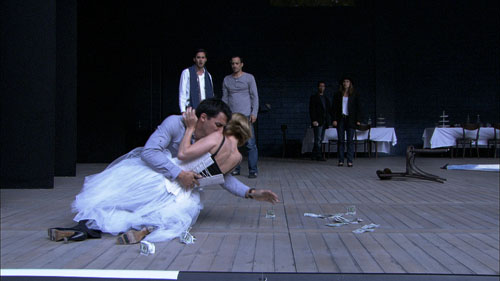What do we really know about what goes into the production of a renowned opera? After watching the documentary Becoming Traviata, well, almost nothing.
A clueless look into an intricate opera

What do we really know about what goes into the production of a renowned opera? After watching the documentary Becoming Traviata, well, almost nothing.
The Northwest Film Center presents Philippe Beziat’s Becoming Traviata, an attempt at understanding the intricacies, tribulations and strenuous work at play in directing the production of what many say is an essential part of the canon in both of opera and live stage performance.
Beginning with many stills of set design tools, art brushes, dirty sinks and rubber gloves and endless pans of backlit chandeliers, the viewer assumes immediately that this is going to be an in-depth and intricate approach to understand everything that goes into a production like La Traviata. The interest is piqued, the pans continue and the viewer is taken to a plain, white room. Anticlimactic much?
Not only is the viewer thrust into the plain, white room, where the beginning stages of rehearsal commence, Beziat also automatically assumes that anybody viewing this documentary has an understanding of what La Traviata is about.
As an individual who has never really been exposed to opera at length, I found myself completely lost—as would anyone else giving this film a chance without extensive knowledge of the opera.
La Traviata, an opera in three acts by Giuseppe Verdi, details the life of “fallen woman” Violetta Valery. The audience does not even know that the opera’s namesake is being portrayed by the actress in focus, and understanding this requires prior research on the opera as no information is provided in Becoming Traviata.
Who is Violetta? Why do we care about her? Moreover, why is production director Jean-Francois Sivadier focusing on minimal things that renowned actress and opera star Natalie Dessay already seems to be doing correctly?
The first hour of the film details a rehearsal where Sivadier nitpicks every actor there, attempting to “perfect” the facial expressions, gestures and overall movement as the piece comes together.
The problem here is that while perfection is important in putting together a production like this, Sivadier approaches the performers in a pretentious, demeaning manor. He treats them like they have never performed in an opera before.
The talent is not highlighted; instead, Beziat’s camera captures all the slight flaws in the performance. Tiny flaws and imperfections are discussed at length with barely a mention of what the actors are doing well.
Eventually the viewer gets some of the set design hinted at in the introduction of the film after being transported to a staged rehearsal, where some of the real magic starts to happen. The music finally takes center stage as a more hands-on look at the craft of the production is provided.
With very few interviews and too much focus on Sivadier’s scathing looks, the viewer still knows nearly nothing about what La Traviata is. We know there is romance, we know Violetta is wealthy—but there has to be more, right?
Becoming Traviata
Friday, May 31, Saturday, June 1, and Sunday, June 2, at 7 p.m.
Whitsell Auditorium at the Portland Art Museum
$9 general admission, $8 students
With appetites whetted and billowing music introduced into the scene, a full-fledged staged rehearsal finally happens. The audience gets a taste of the glamor, the pomp and circumstance, the conceives the slightest notion that this just may be a great opera worth watching. Becoming Traviata, though? Not so much.
As the documentary reaches its climax, the music is building, the tears are welling up—but that is really all the viewer is left with. We get some of that raw emotion the opera is supposed to elicit, but the director’s nitpicking gets in the way of getting a feel for what these actors and actresses are trying to do.
Some of the extravagance is depicted, but only enough to leave the viewer wanting more. Too little is presented at the end of the film, with barely any meat in the middle—not to mention the numerous filler shots that did little to make up for the lack of substance throughout.
Ultimately, Beziat’s focus on minor errors undermines Becoming Traviata, which is only recommended for well-versed opera lovers.






